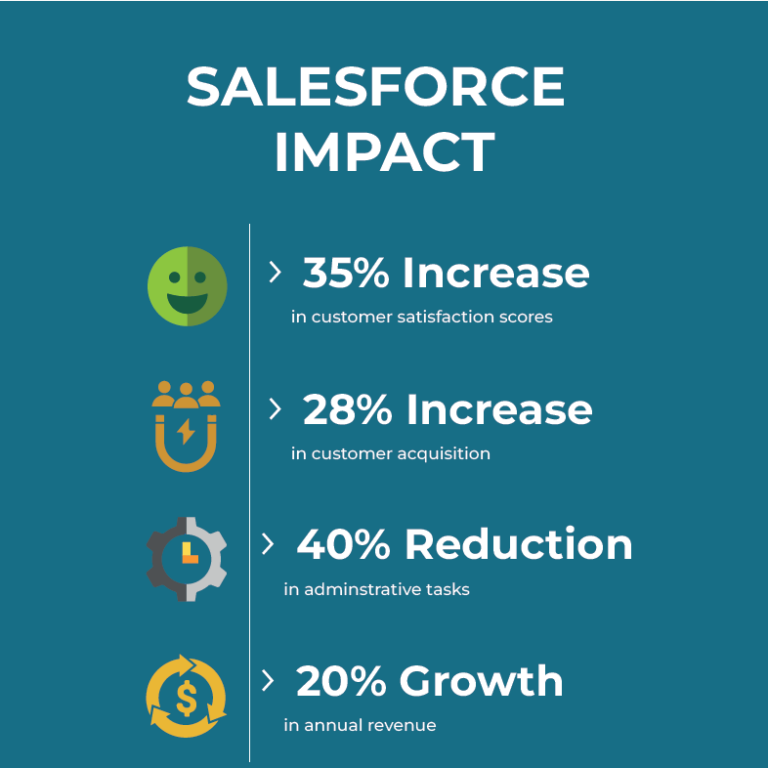This RPA Case Study explores how robotic process automation delivered an 85% saving on time previously spent on manual work.
Salesforce Case Study: Leveraging Salesforce to Elevate Customer Experience
In today’s highly competitive business landscape, effective customer relationship management plays a pivotal role in driving sustainable growth and success. This Salesforce case study explores how a mid-size manufacturing company, successfully leveraged Salesforce to transform their processes, enhance customer interactions, and achieve remarkable business outcomes.
Company Overview
This is a study of a leading manufacturer and supplier of industrial equipment, based in Denver, Colorado. With over three decades of experience in the industry, the company has built a strong reputation for delivering innovative products and exceptional customer service. However, as the business grew, managing customer relationships became increasingly complex, highlighting the need for a robust CRM solution.
Challenges Faced
Prior to implementing Salesforce, the company faced the following challenges in effectively managing their customers:
Data Fragmentation: The company struggled with fragmented customer data residing in various systems, leading to inefficiencies, data duplication, and difficulty in obtaining a holistic view of their customers.
Inconsistent Communication: The absence of a centralized CRM system led to inconsistent communication with customers, resulting in missed opportunities, delayed responses, and an overall suboptimal customer experience.
Limited Analytical Insights: The company lacked the ability to derive meaningful insights from their customer data, hindering their ability to make data-driven decisions and develop effective sales and marketing strategies.
Manual Processes: Manual data entry, repetitive administrative tasks, and reliance on spreadsheets consumed valuable time and resources, limiting the productivity and efficiency of the company’s sales and customer service teams.
Solution: Salesforce Implementation
Recognizing the need for a comprehensive solution, the company decided to implement Salesforce, because of its scalability, flexibility, and robustness, hoping to address their challenges and revolutionize their customer management processes.
Key Benefits and Outcomes
Centralized Customer Data: Salesforce allowed the company to consolidate customer data from various sources into a single, unified platform. This centralized view enabled their sales and customer service teams to access accurate and up-to-date information, resulting in improved collaboration, streamlined processes, and enhanced customer interactions.
Enhanced Customer Engagement: The company was able to personalize interactions, tailor marketing campaigns, and provide timely and relevant communication to their customers. This personalization led to increased customer satisfaction, higher conversion rates, and improved customer retention.
Actionable Insights: Salesforce’s advanced analytics capabilities empowered the company to gain valuable insights from their customer data. Through comprehensive reporting and analytics dashboards, the company could identify trends, forecast sales, and make data-driven decisions, thereby optimizing their sales and marketing strategies.
Automation and Efficiency: By automating manual processes, such as data entry, task assignment, and follow-ups, Salesforce enabled the company to free up valuable time for their sales and customer service teams. This increased efficiency, reduced errors, and allowed employees to focus on high-value activities, resulting in improved productivity and overall business performance.
Results and Statistics
The implementation of Salesforce at the company yielded significant results and measurable improvements in their CRM capabilities:

Customer Satisfaction: The company witnessed a 35% increase in customer satisfaction scores within the first six months of implementing Salesforce, as measured through post-interaction surveys and feedback.
Revenue Growth: By leveraging Salesforce’s personalized marketing capabilities and improved customer interactions, the company experienced a 28% increase in customer acquisition and a 15% increase in customer retention, directly contributing to a 20% growth in annual revenue.
Time Savings: The automation of manual processes resulted in a 40% reduction in administrative tasks for sales and customer service teams, enabling them to spend more time engaging with customers and driving revenue-generating activities.
The company’s successful implementation of Salesforce as their CRM solution exemplifies the power of leveraging advanced technology to elevate customer relationship management. By consolidating customer data, enhancing engagement, gaining actionable insights, and automating manual processes, The company experienced remarkable improvements in customer satisfaction, revenue growth, and operational efficiency. This case study serves as a testament to the transformative impact of Salesforce, demonstrating how businesses can leverage digital transformation to thrive in today’s competitive business environment.


